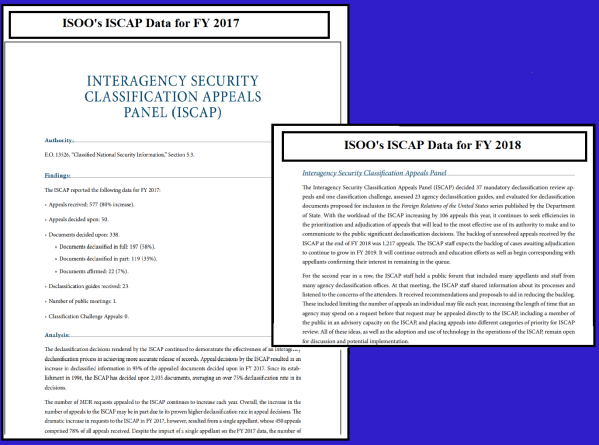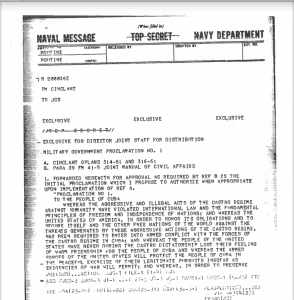ISOO’s FY 2018 Classification Report Continues to Warn of Outdated System, but Lacks Key, Previously-Reported Data: FRINFORMSUM 10/17/2019

ISOO’s FY2018 Classification Report to the President
The Information Security Oversight Office’s 2018 Report to the President is now online – but contains considerably less information than previous years. The gist of the report, which is currently our best tool for analyzing the classification system in the United States, remains the same as last year; namely that the current classification system is “unsustainable, and desperately requires modernization. The investment, adoption, and use of advanced technologies lie at the core of this transformation, but we also need new policies and practices that reflect and support the way the Government actually operates in the 21st century.”
The FY 2018 report, which is only 12 pages long (compared to last year’s 69-page report), notes that:
- In FY2018 the Interagency Security Classification Appeals Panel (ISCAP) decided 37 mandatory declassification review appeals and one classification challenge.” The report does not specify how may MDR appeals the panel received or how many times ISCAP overruled agency classification decisions.
- As a comparison, in FY2017 ISOO reported ISCAP received 577 appeals, an 80% increase from FY 2016, and decided on 50, declassifying 58% of the documents in full and declassifying 35% in part. This important statistic showed ISCAP only affirmed agency classification decisions in full 7% of the time.
- ISCAP has a backlog of 1,217 appeals.
- Original classification authorities decreased from FY2017, continuing last year’s trend. However, there were no metrics on original classification decisions, which have been increasing despite the reduction in original classification authorities.
The kind of statistical data available in previous reporting but missing from this year’s report includes:
- Security classification costs.
- Last fiscal year the government spent $18.39 billion on security classification, a $1.5 billion increase from FY2016.
- Formal Classification Challenges for FY 2018.
- Last FY there were a total of 721, a decrease of 24% from FY2016.
- The total page count for declassification review for FY2018.
- In FY2017 ISOO reported “The total page count for declassification review decreased under automatic, systematic, and discretionary declassification programs by 18%” and noted agencies were “unable to meet the demands of electronic records review.”
- Specifically, for FY2017 there were 83,765,475 pages reviewed for programmatic declassification, of which 55% were declassified.
- There were 693,652 pages reviewed for systematic declassification, of which only 35% were declassified.
- In FY2017, 57,539 pages were reviewed for discretionary declassification review, of which only 38% were declassified.
- Mandatory Declassification Review data.
- The government received 6,540 MDR requests and 635 appeals in FY2017.
ISOO director Mark Bradley acknowledges the considerable difference between this year’s and previous years’ reporting. He cites the challenges in collecting and analyzing agency statistical data, and hints that there will be improved processes and metrics in the future.
Bipartisan Declassification Reform Legislation
Senators Ron Wyden (D-OR) and Jerry Moran (R-KS) recently announced plans to introduce a bill to address declassification reform. Sen. Wyden said that agencies are drowning in classified records and the problem is only getting worse, going on to note that “Many of these records are no longer truly sensitive, so classifying them only creates huge costs for taxpayers without doing a thing to protect national security.” Sen. Moran said “Classified documents that do not impact our national security and no longer need to be protected are a waste of government resources and taxpayer dollars. The current system of maintaining these classified records is outdated and ineffective. This sensible legislation that we plan to introduce would modernize the system to reduce the backlog in processing classified information, cut down on government expense, increase accountability and make the work of our federal agencies more efficient.”

Rep. Cummings receiving his 2019 Sunshine in Government Award.
Mourning the Loss of Rep. Elijah Cummings
Representative Elijah Cummings (D-MD) has died at the age of 68. He was a long-time champion of the Freedom of Information Act and open government, and was a hero to the National Security Archive and many others. Mr. Cummings was the recipient of the 2019 Sunshine in Government Award, and a video of his acceptance speech can be found here. During the speech he told the audience, “I beg you to tear down any walls that might block you from getting info to the American people that they need to know. Stand up for strong FOIA law. Work with us. Don’t be silent. I want our grandchildren to know that we stood up for this democracy. That we, all of us, had great respect for the people who created the Constitution. That we decided to be about freedom of the press & getting the information out. We are at a critical moment in our country’s history. I am so glad that you have been called to this moment to be the guardians of our information and the flow of our information.” (Thank you to Alex Howard for highlighting this passage.)
NY FOIA Request Wins Release of Trump Tax Documents
ProPublica used the New York Freedom of Information law to “show stark differences in how Donald Trump’s businesses reported some expenses, profits and occupancy figures for two Manhattan buildings, giving a lender different figures than they provided to New York City tax authorities.” The documents were responsive under the FOI law because President Trump “appealed his property tax bill for the buildings every year for nine years in a row, the extent of the available records.” ProPublica sleuths then compared the tax records with loan records that became public when Trump’s lender sold the debt.
 TBT – The Cuban Missile Crisis at 57
TBT – The Cuban Missile Crisis at 57
This week’s #TBT pick is chosen with the 57th anniversary of the Cuban Missile Crisis in mind. This 2017 posting from Archive analysts Dr. Bill Burr and Peter Kornbluh uses declassified documents, including the “Military Government Proclamation No.1”, to show how the U.S. military drew up plans to occupy Cuba and establish a temporary government headed by a U.S. “commander and military governor” during the 1962 missile crisis. “All persons in the occupied territory will obey immediately and without question all enactments and orders of the military government,” stated the proclamation. “Resistance of the United States Armed Forces will be forcefully stamped out. Serious offenders will be dealt with severely,” it warned. “So long as you remain peaceable and comply with my orders, you will be subjected to no greater interference than may be required by military exigencies.”
Read the rest at the National Security Archive.
Sign Up
Want to stay on top of the latest FOIA news? Click here to sign up for our weekly FRINFORMSUM (Freedom of Information Summary) email newsletter.

Comments are closed.